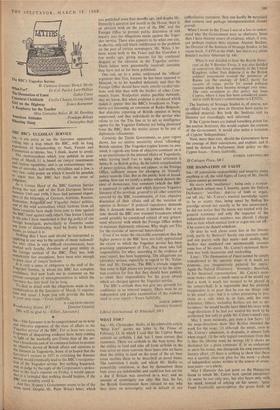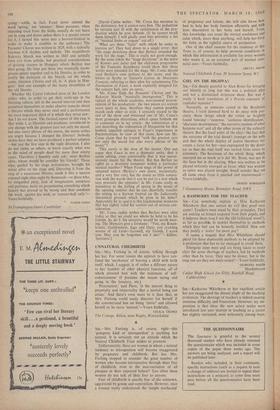THE DAMNATION OF FAUST Sta.—If journalistic responsibility and integrity mean
anything at all, the wild flights of fancy of Mr. David , Cairns cannot go answered.
He starts with 'mutilation': being only a natural- ised British subject may 1, humbly, quote the Oxford Dictionary : 'mutilate: deprive of limb or organ, cut IA, etc.' Mr. Cairns's musical knowledge seems to be so scanty that, being upset by finding his porridge served not exactly as he was accustomed, he did not notice that the music was treated with the greatest reverence and only the sequence of the independent musical numbers was altered. I charg6 him to state which musical limb or organ was cut off if he cannot, he should withdraw.
Or does he wail about some loss in the libretto (only partly by Berlioz)? Surely one connects music and not poetry with that name—and reading that Berlioz was mutilated one automatically assumes some loss of his music. Mr. Cairns's statement there- fore was both inaccurate and misleading.
Later : 'The Damnation of Faust cannot be simply transplanted to the operatic stage,--it is much too dramatic, ,too imaginatively pictorial for opera.' Again the Oxfoid Dictionary : 'dramatic : theatrical, fit for theatrical representation.' Mr. Cairns's state- ment makes about as much sense as if he would say that a work is much too musical to be played in the concert-hall. It is regrettable that his pictorial imagination is so poor that he can see things only in his mind's eye—but it is rather presuming to pro- claim as a rule what is, in fact, only his own deficiency. Others, including Berlioz, are not so un- fortunate: he would hardly have filled his score with stage-directions if he had not wanted his work to be performed, but only to guide Mr. Cairns's mind's eye.
May I, more modestly, just state a few facts: (1) the stage-directions show that Berlioz intended the work for the stage; (2) although the music, even in Mr. Cairns's admission, is dramatic, it always fails when staged; (3) the only logical conclusion from this is that the libretto must be wrong; (4) it shows no disrespect for a great composer if, in an endeavour to serve his music, one disregards his own amateurish literary effort; (5) there is nothing to show that there was a careful, clear-cut plan for the work—a chain of independent scenes written in the course of seven- teen years—as a whole.
May I illustrate this last point on the Hungarian Scene to which Mr. Cairns took special exception? (It seems he not only secs, but also hears only with his mind, instead of relying on his senses: 'poor Faust frantically apostrophises the green fields of
spring'—while, in fact, Faust never uttered the word 'spring,' but 'summer.' Since peasants, when returning tired from the fields, usually do not burst out in song and dance unless there is a special reason for it, 1 turned this scene into a harvest-festival in order to make it credible to the audience.) The Peasants' Chorus was written in 1829, with a typically German 6/8 rhythm and melody. The magnificent Rakoczy March was written in 1845 and actually born not from artistic, but practical considerations of gaining success in Hungary where Berlioz was then going. He later put these two musically incon- gruous pieces together and in his libretto, in order to justify the inclusion of the March, set the whole scene, German Chorus and all, in 'A plain in Hun- gary' Just one example of the many absurdities of the old libretto.
Whether Mr. Cairns followed most of the London critics who, in order" to get their write-ups in the Morning edition, left in the second interval and then permitted themselves to make abusive remarks about a. libretto which they never read and a performance the most important third of it which they never saw : this 1 do not know. The farcical aspect of this case is that while 1, as librettist and producer, considered in any change with the greatest care not only the mood, but also every phrase of the music, the music critics are angry because I changed the libretto! Nobody claims here that we have produced a perfect solution
just the first step in the right direction. I also do not claim, as others, to know exactly what was in the mind of people dead for more than ninety years. Therefore I humbly only ask : were Berlioz alive, whom would he consider his friends? Those who, guided by his stage instructions, brought his music alive on the stage and, liberating it from the clog of a monstrous libretto, made it into a success enjoyed night after night by thousands—or those who, by misguided piety, lack of imagination, meekness and pettiness, insist on perpetuating something which history has proved to be wrong and thus condemn the work, against his wish, to 'concert-hall only.'— Yours faithfully, 34 Trumpington Street, Cambridge
GABOR COSSA
[David Cairns writes : 'Mr. Cossa has recourse to the dictionary; but it cannot save him. The pedantries he extracts sort ill with the recklessness of the pro- duction which he now defends. (If he cannot recall them himself, I will gladly send him privately a list of "musical limbs or organs" cut oft.)
'What are these "facts" with which he seeks to impress us? They boil down to a single error; that "the stage directions show that Berlioz intended the work for the stage." This is really not good enough. By the same token the "stage directions" in the score of Romeo and Juliet and the elaborate programme of the Fantastic Symphony could show that these works were intended for the stage. Mr. Cossa should read Berlioz's own preface to the score, and the letters to Scribe in Tiersot's Lettres de Musiciens Francais, referring to their plan for refashioning The Damnation of Faust, a work explicitly designed for the concert hall, into an opera.
`Mr. Cossa finds the Peasants' Chorus and the Rakoczy March "musically incongruous." This is typical of the whole academic, non-musical precon- ception of his production : the two pieces are sixteen years apart in date, therefore they cannot possibly match each other in style. I certainly stayed to the end of the show and witnessed one of Mr. Cossa's most grotesque distortions, which space forbade me to comment on in my article: the substitution of a text describing the redemption of Marguerite for that hushed, appalled epilogue to Faust's experiences in Pandemonium. In view of this alone, how can Mr. Cossa claim that he treated "with the greatest care not only the mood but also every phrase of the music"?
This surely is the crux of the matter. One can argue that Faust is not a dramatic unity, that it needs editing, even conceivably that it was uncon- sciously meant for the theatre. But has Berlioz no rights as a dramatic composer within a particular musical number? When Faust sings of the power of untamed nature (Berlioz's own poem, incidentally, and a very fine one), has the music so little connec- tion with the words that it can be put to a text which says precisely the opposite? Is Mr. Cossa really so insensitive to the feeling of spring in the music of the opening number that he can cheerfully transfer the setting to a harvest festival on the ludicrously 'theoretical grounds which he gives in his letter? Apparently he is; and it is this fundamental weakness that has rightly ruled his version out of serious con- sideration.
'Mr. Cossa rashly wishes that Berlioz were alive today so that we could see whom he held to be his friends. So do I; his invective would be worth hear- ing. The Memoirs give a foretaste: "You, my Rosen- krantz, Guildenstern, Iago and Osric, you crawling worms of all kinds—farewell, my friends, I. scorn you. May you be forgotten ere I diel" '—Editor, Spectator.]



































 Previous page
Previous page